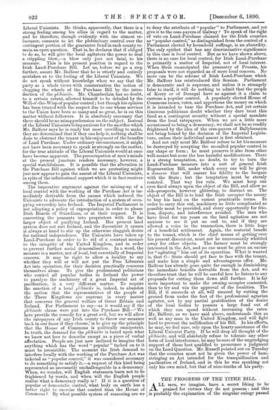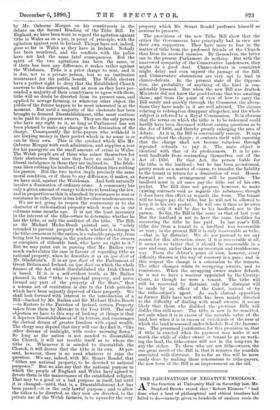THE PROGRESS OF THE TITHE BILL.. - A LL men, we
imagine, have a secret liking to be praised for virtues they do not possess : and this is probably the explanation of the singular eulogy passed by Mr. Osborne Morgan on his constituents in the debate on the Second Reading of the Tithe Bill. In England, we have been wont to regard the agitation against tithe in Wales as on a par, in point of principle, with the agitation against rent in Ireland. Things have not, indeed, gone so far in Wales as they have in Ireland. Nobody has been murdered, and the conflicts with the police have not had the same fatal consequences. But the spirit of the two agitations has been the same, or if there has been any difference, it makes rather against the Welshmen. Tithe is a prior charge to rent, and it is due, not to a private person, but to an institution maintained for the public benefit. The Welsh electors have a perfect right to deny that the Established Church answers to this description, and as soon as they have per- suaded a majority of their countrymen to agree with them, tithe will no doubt be diverted from its present uses, and applied to sewage farming, or whatever other object the public of the future happen to be most interested in at the moment. But until a majority of the electorate has been brought to demand Disestablishment, tithe must continue to be paid to its present owners. They are the only persons who have any right to it, so long as Parliament has not been pleased to make any change in the destination of the charge. Consequently the tithe-payers who withhold it are keeping money in their pocket which in no sense is or can be their own. This is the conduct which fills Mr. Osborne Morgan with such admiration, and supplies a text for his panegyric on the small amount of crime in Wales. The Welsh people are of those who solace themselves for their abstinence from sins they have no mind to by a liberal indulgence in those they are inclined to. The Irish- man likes robbing his landlord; the Welshman likes robbing his parson. But the two tastes imply precisely the same moral condition, or if there be any difference, it makes, as we have said, against the Welshman. And both naturally involve a diminution of ordinary crime. A community has only a given amount of energy to devote to breaking the law, and in proportion as this is absorbed by resistance to rent or resistance to tithe, there is less left for other misdemeanours.
We are not going to reopen the controversy as to the character of ecclesiastical property which went on in our columns some months ago. It is not the least necessary in the interest of the tithe-owner to determine whether he has the tithe, or only the usufruct of the tithe. The Bill, as Sir Michael Hicks-Beach pointed out, is " solely intended to prevent property which, whether it belongs to the tithe-owners or to the nation, is a valuable property, from being lost by remaining in the pockets either of the owners or occupiers of titheable land, who have no right to it." But we may point out in passing that Mr. Raikes very much understates the case in favour of regarding tithe as national property, when he describes it as an ipse dixit of Mr. Gladstone's. It is an ipse dixit of the Parliament of Great Britain and Ireland, an ipse dixit on which the whole finance of the Act which disestablished the Irish Church is based. If it is a self-evident truth, as Mr. Raikes phrased it, that " tithe is parochial property, and never formed any part of the property of the State," then a solemn act of restitution is due to the Irish parishes which have been unjustly deprived of their property. We shall look forward with interest to the introduction of a Bill—backed by Mr. Raikes and Sir Michael Hicks-Beach —to Restore to the Parishes of Ireland certain Property taken from them by Mistake in the Year 1869. The only objection we have to this way of looking at things is that it deprives Disestablishment of its terrors, and encourages the clerical dream of greater freedom with equal wealth. The clergy may depend that they will one day find it, "like other dreams of midnight, with cooler morning flown." So long as the nation is not minded to disestablish the Church, it will not trouble itself as to whose the tithe is. Whenever it is minded to disestablish the Church, it will decree that the tithe is its own. At pre- sent, however, there is no need whatever to raise the question. We say, indeed, with Mr. Stuart Rendel, that " tithes are national property, to be devoted to national purposes." But we also say that the national purpose to which the people of England and Wales have agreed to devote them is the maintenance of the established religion. That may be a good or a bad purpose in itself, but until it is changed—until, that is, a Disestablishment Act has been passed—it is the only lawful purpose ; and to allow the tithes to be diverted, as they now are diverted, to the private use of the Welsh farmers, is to squander the very property which Mr. Stuart Rendel professes himself so anxious to preserve.
The provisions of the new Tithe Bill show that the critics the Government have principally had in view are their own supporters. They have more to fear in the matter of tithe from the professed friends of the Church than from its avowed enemies. By themselves, the latter can in the present Parliament do nothing. But with the unavowed sympathy of the Conservative landowners, they might do a good deal. Chance-defeats in committee might delay and even imperil' the passage of the Bill, and Conservative abstentions are very apt to lead to chance-defeats. In the present state of the Opposi- tion, the probability of anything of the kind is con- siderably lessened. But when the new Bill was drafted; Ministers did not know the good fortune that was awaiting them ; and from the point of view of how to carry the Bill surely and quickly i through the Commons, the altera- tions they have made n it are well advised. The clauses relating to redemption disappear altogether, and the whole subject is referred to a Royal Commission. It is obvious that the terms on which the tithe is' to be redeemed could hardly have been discussed without raising questions as' to the Act of 1836, and thereby greatly enlarging the area of debate. As it is, the Bill is conveniently concise. It says nothing about the charge ; it contents itself with ensuring that the charge shall not become valueless through repeated refusals to pay it. The main object is identical with that of its predecessors. It is to prey vent landlords from contracting themselves out of the Act of 1836. By that Act, the person liable for the tithe is the landlord ; but he has been accustomed, ' pretty much as a matter of course, to transfer the liability to the tenant in return for a diminution of rent. Hence- forward no such arrangement will be possible. The landlord must in all cases pay the tithe out of his own pocket. The Bill does not propose, however, to make existing contracts void as regards the substance, though it does have this effect as regards the form. The tenant will no longer pay the tithe, but he will not be allowed to keep it in his own pocket. He will owe it then as he owes it now, only it will be due to his landlord, not to the parson. So far, the Bill is the same as that of last year. But the landlord is not to have the same facilities for recovering the tithe he has paid. In last year's Bill, tithe due from a tenant to a. landlord was recoverable as rent ; in the present Bill it is only recoverable as tithe, —that is, by distraint. We do not pretend to see any reason for this alteration, since, if it is recoverable at all, it seems to us better that it should be recoverable in a sure and easy, rather than in an uncertain and troublesome, way. From the debtor's point of view, however, every difficulty thrown in the way of recovery is a gain ; and in this respect the change is a concession to the tenants., The other changes relate to occupying owners, and to remissions. When the occupying owner makes default, he is not to have a receiver appointed by the County- Court, as though he were a tenant. The tithe will still be recovered by distraint, only the distraint will. be made by an officer of the Court, instead of by . the tithe-owner's agent. As such clerical opposition as former Bills have met with has been mainly directed to the difficulty of dealing with small owners, it seems likely that those who disliked the previous Bills will dislike this still more. The tithe is now to be remitted, not only when it is in excess of the rateable value of the land, but when it is in excess of two-thirds of the sum at' which the land is assessed under Schedule B of the Income- tax. The presumed justification for this provision is, that if tithe is exacted when its payment may make it not worth the while of either owner or tenant to go on work- ing the land, the tithe-owner will not in the long-run. be any the richer. To those who are not tithe-owners, the one great merit of the Bill is, that it removes the scandals associated with distraint. In so far as this will be more easily done by making these concessions to tithe-payers, the new form of the Bill is an improvement on the old.,























































 Previous page
Previous page